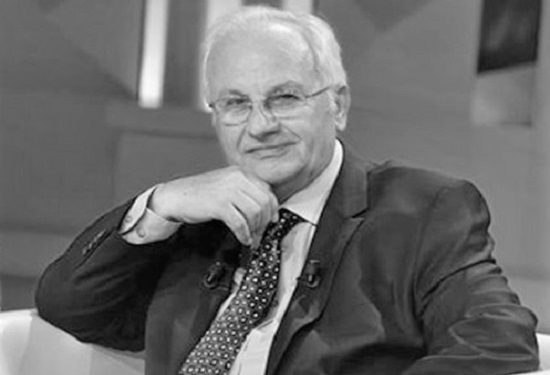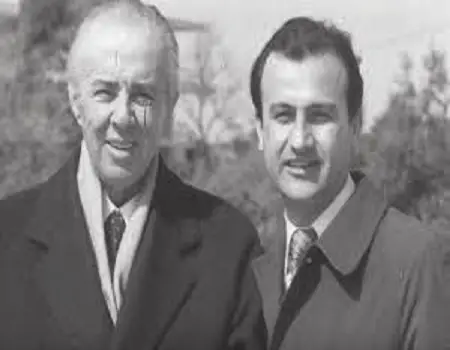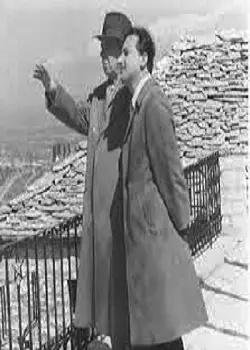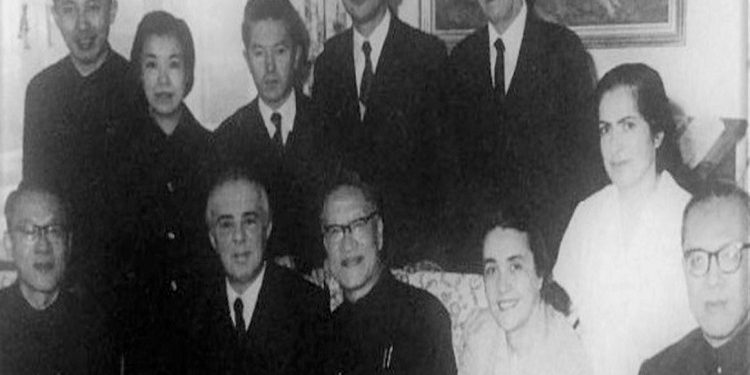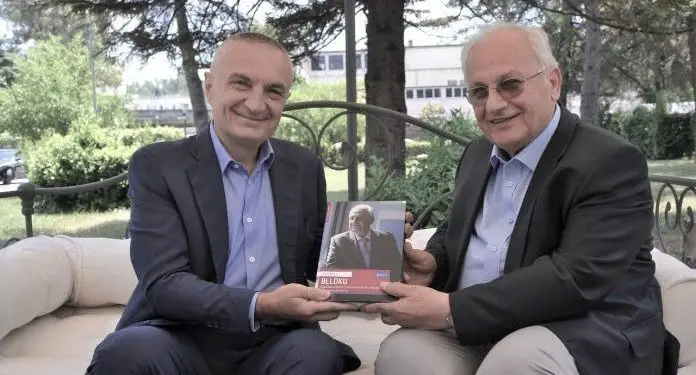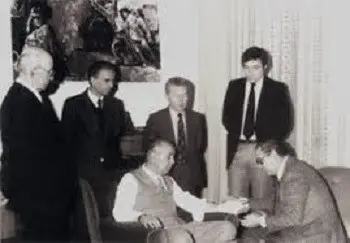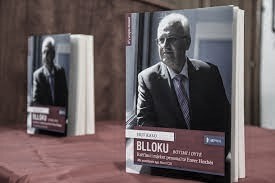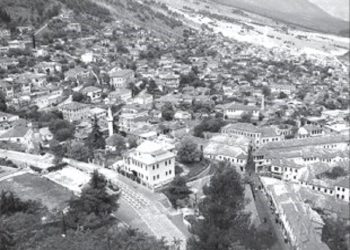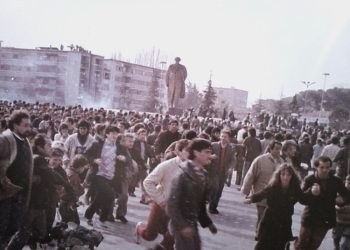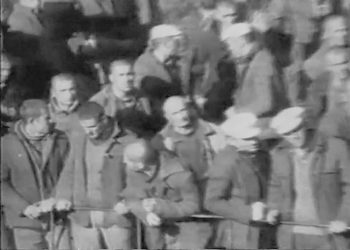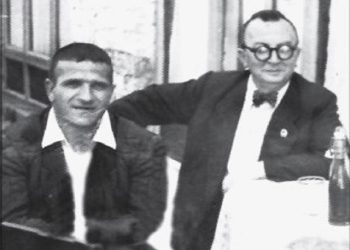From Shpendi Topollaj
-As a tribute to the passing away of the well-known doctor, Dr. Prof. Isuf Kalo, a professional, humanist and intellectual of European proportions –
Memorie.al / The passing away at the age of 80 of the well-known doctor, Dr. Isuf Kalo, has been received everywhere with bitterness and regret. Albanian medicine lost one of its most prominent representatives. In one of the last communications, I realized that he was stoically waiting for the end, when he wrote to me that he was being cured after being sick, but apparently, even medicine has its limits. Somewhat misunderstood at first as the dictator’s doctor, he displayed all his values as a humanist and democratic patriot, winning the love and respect of the people, not only in his tireless help to patients or in all his public appearances, but especially with the publication of the book of memories, about the unknown side of the former “Block” where the high communist leadership of that time lived.
Based on the Roman postulate: “Verba volant, scripta manent”, I am presenting his worldview character, with the analysis of his voluminous book. Perhaps, more than any other work, the book with confessions “Block” by the respected doctor, Prof. Dr. Isuf Kalo, (Published by UET PRESS, 2019), has sparked a lot of discussion. This clearly speaks to the fact that it continues to be forwarded with great interest by many readers. But it could also be called something else: “Between Nexhmija and Ramiz”. But who is this man in the middle? The author of the book himself or much more than him, Enver Hoxha? Ballazi is Isuf Kalo, the skilled, honest and dedicated doctor who, like no one else, with insight and civic responsibility, perhaps a little historical, dared to put down on paper everything he saw mainly in the two of them.
It even went further; he did not deprive himself of the right to analyze and give the end, his honest thoughts about many events and developments both inside the “wasp’s nest” and outside it. And between the lines, we see the great one, the one who, in the state that supposedly built that disgusting Marxist-Leninist mess and under the declared example of Ivan the Terrible of Soviet Russia, surpassed many other dictators in terms of atrocities. Here’s what the author of the book, Dr. Kalo: “Enver copied the model from Stalin, who believed that: ‘A single death is a tragedy. One million killed are statistics”. And, Dr. Isufi says that I can write about him another time, but apparently, he didn’t manage to do it.
It would be great, but even that is enough to highlight the portrait of the two-faced megalomaniac leader. Since the reader himself, both with deductions and with inductions, can easily arrive at the truth. I said with two faces, because no matter how evil a person is, in the family he will behave as a loving, devoted and compassionate father and husband. Family for everyone is expensive and irreplaceable. When you have the opportunity, for every concern that the child may have, you will take him not to Paris, but to the moon. The problem lies in what you think and do for all other families and children, when you have left the country for God.
Of course, good things were also done at that time, such as employment, education, health, plants, factories, reclamation, mechanization of agriculture, electrification, roads, etc., but is there any place in the world that has not done these things, even where where more than in Albania, no matter how many dictators had the leader! That’s why we should remember that Hitler did endless work like this in Germany (even in the spring of ’45, when Berlin was about to burn in smoke and flames, he and Albert Shpeer made projects for gigantic constructions) , but no one can say that he was a good statesman. The state, wherever it is, has that job; to advance the economy, to increase the well-being of the people, to culture them as much as possible and to strengthen their love for the homeland.
But when, in addition to this declared intention, he terrifies his people with absurd punishments and with fear, with prisons and exiles, with shootings of innocent people and loyal comrades-in-arms, he blinds them and does not let them see around twist it, suppress it and degrade it spiritually, impoverish it to the limits of misery with adventurous policies, isolate it from the world, robotize it to make it an obedient tool for the sake of power, then, the merits you may have are not worth at all. Confucius once said that: “Even if you have excellent skills, but you are arrogant, they are not worth considering.” So Chinese philosophy only talks about arrogance and not cruelty.
That atrocity is done by the Neros. Then, it should be remembered that even the mass of those who will read his book are divided. After all, it must be admitted that there are still many of those who have time left where Aleksandr Solzhenitsyn so beautifully describes it, in his major book “The Gulag Archipelago”, where, among other things, he writes: “Once in the cradle they sang the song to us: The whole power to the Soviets’! We were the ones who held that black child’s dog towards the pioneer’s trumpet and the call: Be ready’, we answered: ‘Always ready’! This may have been the biggest dilemma of the author of the book, Dr. Isuf Kalo, before he decided to write it, but that he has successfully overcome.
He, from the not at all comfortable position where he was, for the sake of human morality that stems from the gratitude of being held close, has tried to treat the visible characters, but also the invisible one, according to Pascal’s principle that: “Greatness is not shown by standing on one extremity, but touching both at the same time”. It must be admitted that almost all of us believed in what we were told, from the propaganda studio of Ramiz Ali and the Institute of Marxist-Leninist Studies of Nexhmije Hoxha, with the blessing of the master of manipulation, Enver Hoxha. We didn’t know that Franc Kafka said: “Believing in progress does not mean that progress has happened”.
But, Kafka, you couldn’t write his name in your mouth and stop reading and studying it. That in Albania of that time there was “a much bigger head” than all the philosophers of the world. A philosopher who had seen the West and who paradoxically had a rather rich library. A library, where he had memorized “The Ruler” by N. Machiavelli, but surprisingly he had escaped Shakespeare’s “King Lear”, about which N. A. Dobrolubov wrote: “Noticing Lear, at first we feel hatred towards this corrupting despot, but following the development of the drama, we agree with him, we sympathize with him as a person who feels indignation and resentment now, not against that barbaric and inhuman condition that can lead even a man like King Lir to depravity”!
And this “King” of ours, in contrast to Liri, the more the years passed, the more he became wild to the point of rage. This is how it is expressed in one case, the author of the book, Dr. Isufi: “Enver was obliged to declare Mehmet an enemy, because otherwise history would one day declare him guilty of his tragic end. Secondly, if he was sentimental, the framework of the regime of fear and punishment that he had set up for four decades in a row, in order not to tolerate in any of his collaborators disobedience, rebellion, freedom of decision-making, bypassing and secrecy towards him, would collapse. “. And he did this to the closest person in leadership. And what more can be expected from this author, to stigmatize the dictator Enver Hoxha?!
He, of course, would not write about him and his system, like Pjeter Arbnori or Uran Kalakulla and Visar Zhiti with friends who, as much as he stood by the dictator as a doctor in “Blok”, they suffered the horrors of the prison Burrell. Also, as it appears in the book, Dr. Isufi clarifies that even after they fell into difficulties, losing their power and with it their privileges, being punished by opinion and the law and being rightly described as the most responsible for the disasters and the legendary destruction of the state, saving that with consciousness towards the slope, even Ramizi with Nexhmija, they do not resemble King Lir anywhere. Those with their writings, memoirs and published books, not only confirm the servility to the point of submission to Enver Hoxha, the support they gave him, but they also did not feel any twinges of conscience. On the contrary, apologizing to Enver Hoxha, they almost say: “Well done”! And what mercy, and a little more, sympathy, should we feel for these samples?
Dr. Isufi, in addition to deep analyzes based on a superior reasoning for many events that happened among the residents of the “Block” and that never ended, also makes psychological analyzes of the characters who lived in that Albanian “paradise”. They are worthy of Zweig’s pen. Note how he expresses himself, about Mehmet Shehu’s so-called suicide (Ah, if only it were her!): “When you kill someone, it’s a crime; when you kill yourself it is a sin, when you allow yourself to be killed, it is submission; when a ‘dishonored’ and government official as high and as powerful as Mehmet, humbled himself and surrendered without dignity to the injustice that was done to him, what could ordinary citizens do against the violence and injustices of the government against them”?!
Dr. Kalo was noble. He with an almost aristocratic culture and upbringing, which honors all our intellectuals, had an admirable self-restraint when he had to speak for others. As much as in no line, he did not know how to brag, as much as he tried to appreciate and respect his friends and other specialists warmly, full of kindness and without passion. He was inclined only by the good. He looked for it and found it in everyone. Even in those of great sins. That man is complex. It gives us the portraits of Nexhmije and Ramiz in detail, in the gradual transformation they undergo, with their good and bad, with the similarities and contrasts they showed, with care for relatives, but with contempt for others, that is, with no their coherence.
Remember the sensitivity that the dictator’s wife shows in the letters written to Dr. Isufit in Paris, for her daughter and the disregard or rather, the callousness she shows towards another mother, friend and former comrade-in-arms, (Liri Belishova), whose daughter is dying of cancer. Dr. Kalos, carrying out the assigned task within the “Block”, does not lack the sharpness of vision to sadly see the real and miserable situation of the people who are faced with shortages of the most necessary. In no line does he say, like anyone else, that he did not know the state of poverty. Likewise, he nowhere doubts that the blows to the annihilation of people were the result of their betrayal or enmity and that they were “eliminated for the good of the people”. He knew that we acted according to the Roman principle: “Per fas e per nefas”, i.e.: “By fair and unfair means”.
He, (Dr. Isufit), asserting that he himself joined those who had certain privileges, felt sorry for those who suffered from the dictatorship. The absurdity of the revenge reached his children and nephews, and he couldn’t help but be impressed. He had a clear mind, he knew the behavior of dictators throughout history, so he knew how far they hit and his heart was full of love for the common people. Dr. Kalos, then the words of Kafka fit: “I used to not understand why I couldn’t find answers to my questions, but now I don’t understand why I have to ask”! It is the question that many people struggled with and that Vera Bekteshi formulated so beautifully in her book: “I have never understood why our Leader was so greedy in his punishments left and right, he did it as a pleasure from unlimited power, or from the fear of losing this power? Or were both together”?!
And in this book, Dr. Isufi takes his reasoning further and does not hesitate to refer to the Polish Nobel laureate Ë. Szymborska, who says: “We learned to be forced to eat each other’s lives in order to survive.” This is how we were also caught up in the smoke of the deceptive propaganda of the couple Nexhmije – Ramiz, who in a dramatic laboratory sought to create the “new man”, always according to the wishes of the Albanian “Pharaoh”, Enver Hoxha. In “Blok” and its important residents, they not only ate each other, but also guarded themselves like the devil from incense, to the one who had created the abominable cult. Byzantium was reborn. We find these in those intrigues, plenums and congresses that Dr. Pass, in his book.
The fact that he maintained then, but still to this day, the greatest regard for the world-famous writer, Ismail Kadare, and quotes him from time to time, but also many other figures, often even within the “Block”, but who had realized early on that that system had no future, has an indisputable meaning, to understand the figure of Dr. Skip it. In the Albanian reality, there are few men who have the courage, wisdom, erudition and humanity, who fearlessly overcome the possible prejudices of the bigots, as Dr. Isuf Kalo. Just as he gives a rare example of understanding the need for democracy and the criticism he makes of its shortcomings, not few of them. It is difficult to find an intellectual and professional of this format who always expresses with such love and appreciation for the honest contribution of colleagues with whom he was connected, even temporarily.
Just as it is not easy to find someone else who remains a staunch friend to anyone, regardless of the opposite alignment of beliefs or political formation. Moreover, he is presented not only in this book, but also in the interviews given on various television channels, the model of the modest intellectual, tolerant, self-contained, cool-headed and understanding, towards anyone who does not share the same opinion with him or even those who criticize him, sometimes completely undeserved. He, with his calm, reasonable speech and extraordinary patience, looked you straight in the eye with kindness. His benevolent gaze, like all that he so wonderfully wrote, is a call to union. He, as if to say: “Enough with separation and quarrels.” That’s not how you go in Europe. Let’s learn from our experiences”.
Dr. Isufi, at his age, did not behave like this for his career, because he was fed up with it. He only sought to remain true to the end. No one forced him to write in the chapter dedicated to the exodus: “The sight of the ships overflowing with them (the hopeless poor. SH), was described by the foreign press as apocalyptic, biblical and extremely shocking to the TV viewers of Italy, Europe and the whole world. They were a chilling, depressing picture of the misery of a country and its people who felt threatened by scarcity, and who were fighting for existence”! Someone, in a hurry, or without reading his book at all, (well-known public names, with limited knowledge of the communist period, attacked him the day after the book came out), managed to say that: Dr. Isufi indirectly defends Nexhmija, Ramiz and Enver himself.
But I think this paragraph alone refutes these completely unfair claims of those critics. Just as in the book there are endless descriptions of the tragic whims and rages of the bloodthirsty dictator (the whims of Nexhmije and Ramiz), or other narrow-minded bureaucrats and his disgust for them. That there is no other way to explain his belief that: “Such a generation, with virtues and universal human moral values, will not lie to anyone and will not be lied to by anyone.” And at the end of these notes, I cannot help but say that; it would be great luck, if Dr. Isuf Kalo, in addition to the contribution recognized in Europe in the fight against the widespread disease of diabetes, had found time to dedicate him early on to our journalism and literature.
As he fascinates you with both his cultural level and the style he uses in his books. So I have no choice but to repeat the words of Steve Weinberg in “The Seattle Times”, about the novel “Echo of Memory” by Richard Powers: “A designer of the highest class … his characters travel long in the memory” . As for Enver Hoxha, he will continue to appear in our dreams for a long time. While Dr. Isuf Kalo, left this life honored and his work and example will not be easily forgotten. Memorie.al




